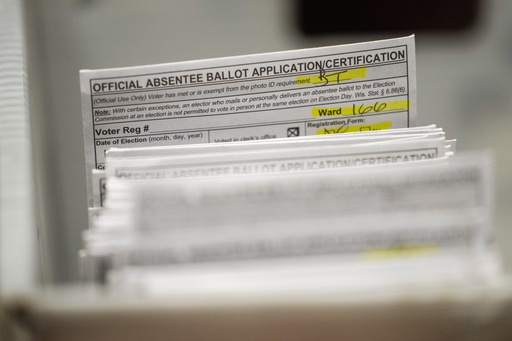
MADISON, Wis. (AP) — A federal judge has thrown out a lawsuit brought by Democrats that challenged Wisconsin’s witness requirements for absentee voting, a ruling that keeps the law in place with the presidential election six months away.
The rules for voting in Wisconsin are of heightened interest given its place as one of a handful of battleground presidential states. Four of the past six presidential elections in Wisconsin have been decided by less than a percentage point, including the past two.
U.S. District Court Judge James Peterson tossed the lawsuit Thursday, saying the fact that the law has stood unchallenged in one form or another since the 1960s was “telling.”
“It may be debatable whether the witness requirement is needed, but it is one reasonable way for the state to try to deter abuses such as fraud and undue influence in a setting where election officials cannot monitor the preparation of a ballot,” Peterson wrote.
National Democratic law firm Elias Law Group, representing four Wisconsin voters, had argued that the state is violating the federal Voting Rights Act and Civil Rights Act by demanding a witness signature on ballot envelopes.
The voters argued that they have a hard time securing a witness signature because of health risk, age and frequent travel overseas.
State law requires clerks to reject absentee ballots that are missing a witness’ address or signature. A Wisconsin judge ruled in 2022 that elections officials cannot correct or fill in missing information on witness certifications, a practice known as ballot curing.
The Voting Rights Act prohibits states from requiring a voter to “prove his qualifications by the voucher of registered voters or members of any other class.”
The judge said the voters had not shown that either the Voting Rights Act of 1965 or the Civil Rights Act of 1964 prohibits a state from requiring absentee voters to prepare their ballot in front of a witness.
“Neither side cites any evidence regarding the effectiveness of the witness requirement in preventing abuses or the number of citizens who cannot vote because of the requirement,” Peterson said. “But regardless of how effective or burdensome the requirement is, the federal laws at issue in this case simply do not apply to it.”
Attorneys for the voters who brought the lawsuit did not return messages seeking comment Friday. A spokesperson for the Wisconsin Elections Commission, the defendant in this case, also did not return a message.
Nine states require witness signatures to verify absentee ballots and three states require an absentee ballot envelope to be notarized, according to the National Conference of State Legislatures.
In Wisconsin, witnesses for most voters must be U.S. citizens and at least 18 years old. Witnesses for overseas and military voters are not required to be U.S. citizens.
In a random review of nearly 15,000 absentee ballots cast in the 2020 presidential election in Wisconsin, the nonpartisan Legislative Audit Bureau found that nearly 7% of the witness certificates were missing at least one component of the witness’ address.
The ruling comes ahead of the Wisconsin Supreme Court hearing oral arguments Monday in another case related to absentee ballots. In that one, Democrats are trying to overturn a 2022 court ruling that prohibited the placement of absentee ballot drop boxes anywhere other than inside election clerks’ offices.
In January, a Dane County judge sided with Democrats in ruling that election clerks can accept absentee ballots that contain minor errors such as missing portions of witness addresses. That ruling has been appealed.
